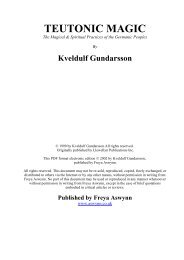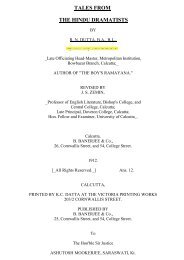Untitled - Awaken Video
Untitled - Awaken Video
Untitled - Awaken Video
Create successful ePaper yourself
Turn your PDF publications into a flip-book with our unique Google optimized e-Paper software.
Chapter 6. The Sky 166<br />
20 th century, folks are simply looking for money to grab as opposed to bringing an<br />
unwholesome state back into a sense of wholeness.<br />
On the other hand some communities have sold themselves into slavery by grabbing<br />
for Andvari’s Gold. They bring in businesses, manufacturing firms and government<br />
deals looking to increase the value of their own meager holdings only to find<br />
that twenty years down the line they have lost all control and rights. Entire towns<br />
have lost water rights, mineral rights, land rights, and access rights—all passed over<br />
to mega-businesses and governmental agencies to increase the value of property by a<br />
few points. To the ancient Germanic peoples, stewardship over family land-holdings<br />
was considered a sacred duty; gold and cattle were the mobile forms of money, but<br />
man without land was a slave. In this sense, the western hemisphere is filled with<br />
slaves, as well as outlaws.<br />
There is an Anglo-Saxon saying that goes “Plan as if you are going to live forever,<br />
but work as if you are going to die tomorrow.” In other words, ”Don’t do anything<br />
today that you or your decedents might regret somewhere down the line.” 31 Germanic<br />
mythology is filled with such tales of rash decisions which needed amending.<br />
Often such tales were intended to be somewhat humorous and most often resulted<br />
in the individual God’s (usually Loki, the mischief-maker) taking responsibility for<br />
the act committed. For the ancient Germanic peoples,“taking responsibility” was<br />
considered to be an honorable act. Adam of Bremen in describing the Danes of<br />
Sjælland said that<br />
“if they are caught in crimes affecting the royal interest or other wrongdoing,<br />
[they] would rather lose their heads than their hides. No kind of<br />
punishment is found there other than the axe and enslavement; and when<br />
a man is condemned, then to be cheerful is an honor. For the Danes so<br />
abominate tears and lamentation and other kinds of sorrow, which we count<br />
salutary, that a man is allowed to weep neither for his sins nor for the dead<br />
who were dear to him.” 32<br />
It should be noted that “tears and lamentation” were not unknown; even the Goddess,<br />
Freyja, lamented the loss of Her husband, Óð, and all things shed tears at the<br />
death of Balder, the son of Óðínn, with the exception of Þökk, a cave-dwelling giantess,<br />
who, at the time of Snorri, was presumed to be Loki. But, taking responsibility<br />
was considered to be honorable, a sacred duty, and tears were not to be shed.<br />
31 The modern version might go something like this: ”Plan as quickly as possible, work like<br />
you are going to live forever, and when the inevitable foul-ups occur (as they will, due to poor<br />
planning), either do a patch job or fudge the data at the end of the project.” We tend to skimp on<br />
planning these days and spend millions of dollars in man-hours fixing up botched jobs. Somehow<br />
we are made to feel that this is acceptable.<br />
32 P. G. Foote and D. M. Wilson, p. 18.
















